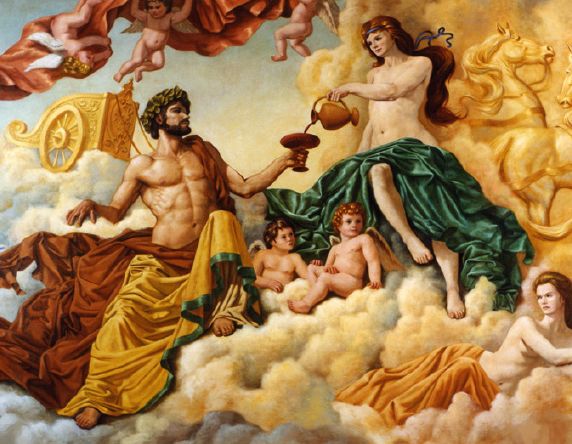Today's post is going to be about both a Roman god and a Greek one, because I realized belatedly that I hadn't talked before about Dionysus, the Greek god of wine. Most of the stories I know for the Roman god Bacchus apply to his Greek personality, so I thought I'd do a post that covered both.
I believe I've mentioned Dionysus in a few posts, though I never actually talked about just him. Dionysus is one of what I like to refer to as "the party gods". My mythology teacher referred to he and Aphrodite as being gods of, essentially, "sex, drugs, and rock and roll." What I hope you take from this is that Dionysus is primarily the god of a good time. He rules over the vine and the grape...and, of course, the wine that comes from the grape.
Bacchus is the Roman form of Dionysus, and he is likewise the god of drinking and partying. Celebrations and festivals in worship of Bacchus were called "bacchanalia", a word which translates to "a drunken revelry". I've heard it used in various TV shows (usually British in nature) to describe carousing around college campuses. Minus the hangover in the morning, Dionysus/Bacchus sounds like a pretty good god to worship...right?
Well...kind of.
The devotees of this god are shown in the story to be a little crazy. In fact, I seem to recall some comments in my mythology class about them acting like they were on PCP, and it's not far off. This is best shown by an old Greek play about Dionysus called The Bacchae, which I shall try to highlight below.
Dionysus was the son of Zeus and a mortal woman named Semele. Zeus, up to his usual tricks, had taken a different form when he bedded the human. He was quite fond of Semele, and one day when she begged him for a favor he promised one to her without waiting to hear what it was.
Big mistake.
Semele desired to look upon Zeus' true face - a desire fanned by a jealous Hera, wife of Zeus, who was unamused to see her husband keeping yet another mistress. The true forms of the gods are too much for any mortal to behold. Zeus was compelled to keep his word, but doing so caused Semele to spontaneously burst into flame.
The child in Semele's womb, Dionysus, was saved, and Zeus sent him to be raised by a group of nymphs. However, the boy god always remembered his mother fondly.
The main premise of The Bacchae is Dionysius returning for vengeance upon his mother's family, none of whom believed her when she said she had become pregnant by Zeus.
Now, the female followers of Dionysus are called maenads. They are the ones who miiight be on drugs. Their devotion to the god makes them insanely strong, fast, and willing to do anything in his name.
For the first part of his vengeance, Dionysus makes his three aunts his loyal servants, turning the naysayers into maenads. These women are royalty, supposed to be quite haughty and civilized...but in the name of the god they quite literally tear animals to pieces with their bare hands.
But wait! There's more!
The current king of the city is Pentheus, the son of one of Dionysus' aunts. He doubts in the stories of Dionysus' divinity, and of the wooing of Semele (if it can be called that) by Zeus.
The story of vengeance is long and complicated, for Dionysus plays mind games with Pentheus throughout the play to attempt to make him recognize the god as divinity. In the end, as Pentheus is beginning to realize that maybe Dionysus truly is a god, Dionysus sics his female relatives upon him.
Pentheus is torn limb from limb by his own mother, who then proudly carries her son's decapitated head back to her own father. She presents her "trophy" to him and is confused when he is horrified instead of pleased - besotted in her devotion to Dionysus, the woman thinks the head is that of a mountain lion she has slain.
Still confused, she hangs it up on display and calls for Pentheus to come and marvel at her kill...at which point Dionysus allows his powers to wear off of her, so that the woman can see that she murdered her own son in the most violent fashion imaginable.
The story ends with Dionysus' three aunts being sent off into exile. Dionysus declares that his grandfather and his wife shall be turned into snakes to complete their punishment.
The god's vengeance is complete.
Most people think of Dionysus - and, by extension, Bacchus - as being the god of a good time. This is accurate. However...neither one is a god you want to cross.
If you get a chance, I'd hugely recommend reading The Bacchae. It's a fascinating play, very well written, and I quite enjoyed it.
I'll see you guys next week!

No comments:
Post a Comment